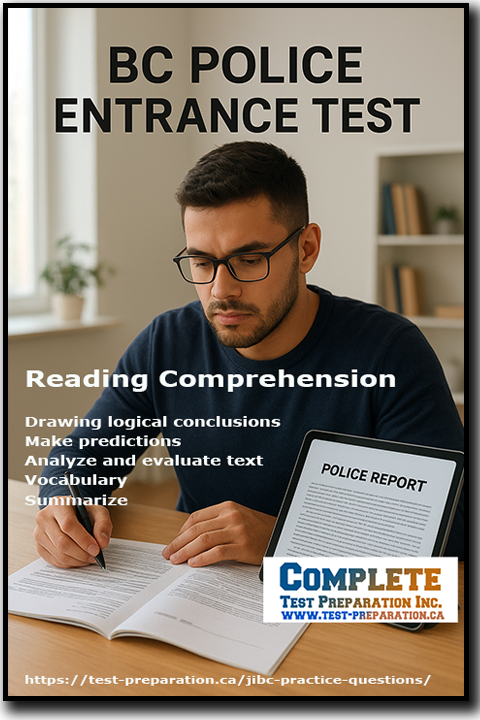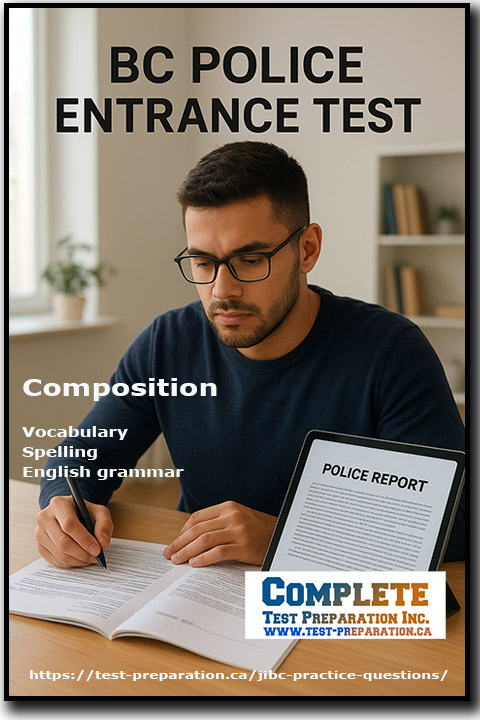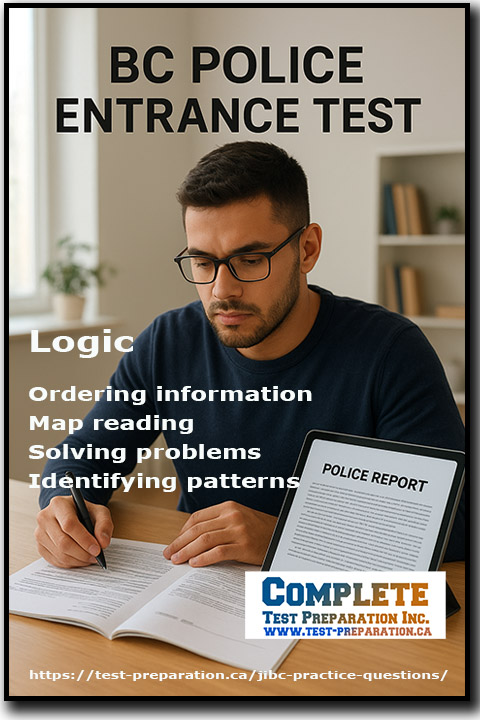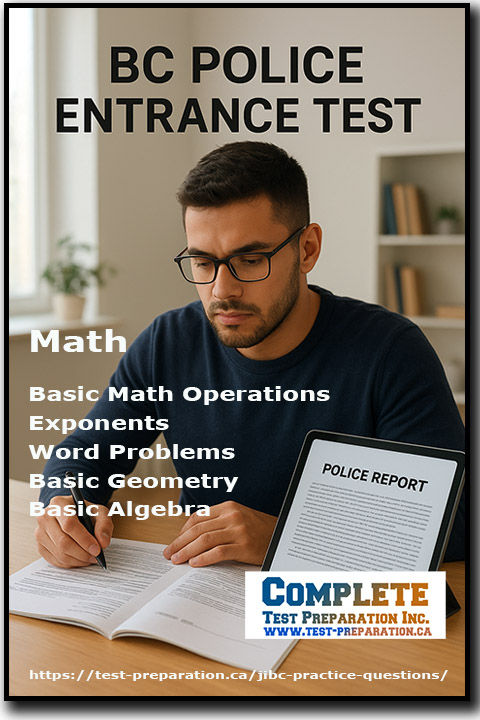
Taking the Justice Institute of BC Police Entrance Test?
We can Help!
Study Practice Course
Try a FREE Quiz
Start Your Law Enforcement Career with Confidence
Are you preparing for the BC Police Entrance Test offered by the Justice Institute of British Columbia (JIBC)? This essential exam is your first step toward a rewarding policing career — and the right preparation can make all the difference.
Our BC Police Entrance Test Practice Guide gives you everything you need to succeed. It’s packed with realistic practice questions, detailed step-by-step explanations, and proven strategies designed specifically for the JIBC entrance exam. Whether you’re just beginning your preparation or brushing up before test day, this guide helps you understand the test format, manage your time, and build the confidence to perform your best.
This complete resource covers every part of the exam — Reading Comprehension, Composition, Memory & Observation, Logic, and Basic Math — with sample questions that mirror the actual test.
Get ready to study smarter, reduce stress, and pass the BC Police Entrance Test the first time.
Reading Comprehension
Reading comprehension is important for police officers because their job involves a lot of reading, analyzing, and communicating information effectively.
Reading and understanding law and policy. Police officers must be familiar with a wide range of laws, policies, and procedures, such as criminal codes, search and seizure laws, and use of force policies and more. Strong reading comprehension skills are needed to interpret and understand complex legal documents accurately.
Communication. Police officers must communicate with a wide variety of people, including victims, witnesses, colleagues, and members of the public. The must accurately read and understand written messages, such as emails, reports, and memos.
Critical thinking and decision-making and logic. Police officers must analyze and evaluate information quickly, make informed decisions based on the information, and take appropriate action. This requires strong reading comprehension skills to understand the context, meaning, and implications of the information they receive.
Assessing risk. Police officers must assess potential risks and hazards in a variety of situations. They are often required to read and understand warning signs, labels, and instructions to avoid endangering themselves or others.
Reading Comprehension Practice
Reading Comprehension I
Reading Comprehension II
How to Answer Reading Comprehension
Types of reading questions that generally appear on the exam.
- Drawing logical conclusions
- Make predictions
- Analyze and evaluate the use of text structure to solve problems or identify sequences
- Vocabulary – Give the definition of a word from context
- Summarize
Composition
Grammar, composition, and vocabulary are important for police officers because they are required to communicate effectively and accurately verbally and in writing.
Writing reports. Police officers are required to write reports that document incidents, investigations, and arrests. Written reports must be clear, concise, and accurate, with proper grammar, spelling, and punctuation. Poorly written reports can lead to legal problems, misunderstandings, and inaccuracies.
Testimony in court. Police officers often testify in court. Effective communication skills, including proper grammar, vocabulary, and composition, are essential for clear and accurate testimony.
Public relations. Police officers must communicate effectively with the public, including victims, witnesses, and community members. Poor communication skills, including incorrect grammar and limited vocabulary, can lead to misunderstandings, lack of trust, and poor public relations.
Interagency communication. Police officers often work with other law enforcement agencies, emergency services, and government organizations.
Questions likely in this section will test your ability to articulate in writing, complex thoughts in a clear and concise way that is understandable to others.
This includes, vocabulary, spelling and English grammar.
Practice
The BC Police Entrance Test is your gateway to a high-demand and high paying career.
Don’t leave your future to chance — prepare with confidence!
PDF Download Version — Online Course — Paperback (Amazon)
Logic and Problem Solving
Logic and problem-solving skills are crucial for police officers. Police are often faced with complex and challenging situations that require quick thinking and effective decision-making.
Investigations. Police officers gather and analyze evidence to solve crimes. This requires skills such as identifying patterns, analyzing evidence, and drawing logical conclusions from evidence.
Critical thinking. Police officers are often in stressful and dangerous situations, and must evaluate information quickly and accurately to determine the best course of action. They must be able to assess potential risks and outcomes, weigh evidence.
Emergencies. Police officers must react quickly and logically in emergencies, for example, natural disasters, accidents, and terrorist attacks. They must assess the situation, evaluate potential risks, and take appropriate action to protect themselves and others.
Types of Questions likely to appear on the test:
- Ordering information in a logical sequence
- Map reading
- Solving problems
- Identifying patterns in data
Logic Practice Questions
Basic Math
Basic math is important for police officers because they must perform a wide range of calculations. For example, calculating distances, speeds, and times to determine how long it will take to respond to an emergency or to chase down a suspect. They may also need to calculate the trajectory of a bullet or the angle of a collision to reconstruct a crime scene. In addition, police officers may need to perform basic accounting tasks, such as counting cash and tallying expenses, when managing departmental budgets or handling evidence.
Questions include:
- Basic Math Operations
- Exponents
- Word Problems
- Basic Geometry
- Basic Algebra
Math Practice
The BC Police Entrance Test is your gateway to a high-demand and high paying career.
Don’t leave your future to chance — prepare with confidence!
PDF Download Version — Online Course — Paperback (Amazon)
By: Brian Stocker MA.
Published by: Complete Test Preparation Inc. | Canadian Small Business
Updated: Saturday, January 3rd, 2026
Published: Friday, February 14th, 2020





1 Comment
Good practice thx – some of the logic questions are different format and others aren’t on the test but good